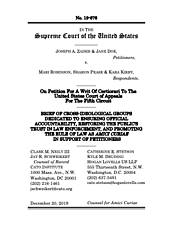Learn more about Cato’s Amicus Briefs Program.
For the last two years, Cato has been engaged in a strategic amicus campaign to convince the Supreme Court to reconsider qualified immunity – an atextual, ahistorical doctrine that shields state agents from liability even when they violate people’s constitutional rights. Today, Cato filed two briefs, on behalf of both itself and eleven other public policy groups from across the ideological spectrum, in support of two major cert petitions that ask the Court to take up exactly this question.
The first, Zadeh v. Robinson, is a case out of the Fifth Circuit, in which administrative state officials of the Texas Medical Board executed a no-notice administrative subpoena on the medical offices of Dr. Joseph Zadeh. Working at the urging of the DEA, Board investigators demanded immediate production of significant quantities of confidential patient medical information, including private patient records concerning mental health issues and domestic relationships. The Board ultimately obtained the information by threatening to revoke Dr. Zadeh’s medical license, and Dr. Zadeh subsequently filed a Section 1983 action. Both the district court and the court of appeals unanimously held that the investigators violated Dr. Zadeh’s constitutional rights, but a split panel nevertheless granted qualified immunity to the defendants. Judge Don Willett dissented, arguing both that the Fourth Amendment violation in this case was “clearly established,” but also discussing his “broader unease with the real-world functioning of modern immunity practice.”
The second, Corbitt v. Vickers, is a case out of the Eleventh Circuit case, in which a split panel granted qualified immunity to a deputy sheriff in Coffee County, Georgia, who shot a ten-year-old child lying on the ground, while repeatedly attempting to shoot a pet dog that wasn’t posing any threat. The majority declined even to resolve the constitutional question, and simply noted that there was no prior case law involving the “unique facts of this case,” in which a child was accidentally shot while the officer was intending to shoot someone (or something) else. The case provoked a powerful dissent from Judge Charles Wilson, who began his opinion by noting that “[b]ecause no competent officer would fire his weapon in the direction of a nonthreatening pet while that pet was surrounded by children, qualified immunity should not protect Officer Vickers.”
The petitioners in both cases are represented by Paul Hughes, co-chair of the Supreme Court and Appellate Practice Group at McDermott Will & Emery. And both petitions explicitly ask “[w]hether the Court should recalibrate or reverse the doctrine of qualified immunity.”
Cato filed amicus briefs in support of both petitions, on behalf of a cross-ideological alliance of a dozen different public policy groups, which also includes the Alliance Defending Freedom, the American Association for Justice, the ACLU, Americans for Prosperity Foundation, the Due Process Institute, the Law Enforcement Action Partnership, the MacArthur Justice Center, the NAACP Legal Defense Fund, Public Justice, R Street, and the Second Amendment Foundation. The brief argues that qualified immunity exacerbates the ongoing crisis of accountability in law enforcement, by regularly denying justice to victims whose constitutional rights are violated. This hurts not only the victims of official misconduct, but law enforcement professionals themselves, by denying them the credibility and respect they need to do their jobs safely and effectively. The brief further argues that stare decisis should not stop the Supreme Court from reconsidering qualified immunity, in large part because the “clearly established law” standard is so malleable and indefinite that it has failed to create the kind of stability and predictability that justify respect for precedent in the first place.

This work is licensed under a Creative Commons Attribution-NonCommercial-ShareAlike 4.0 International License.


